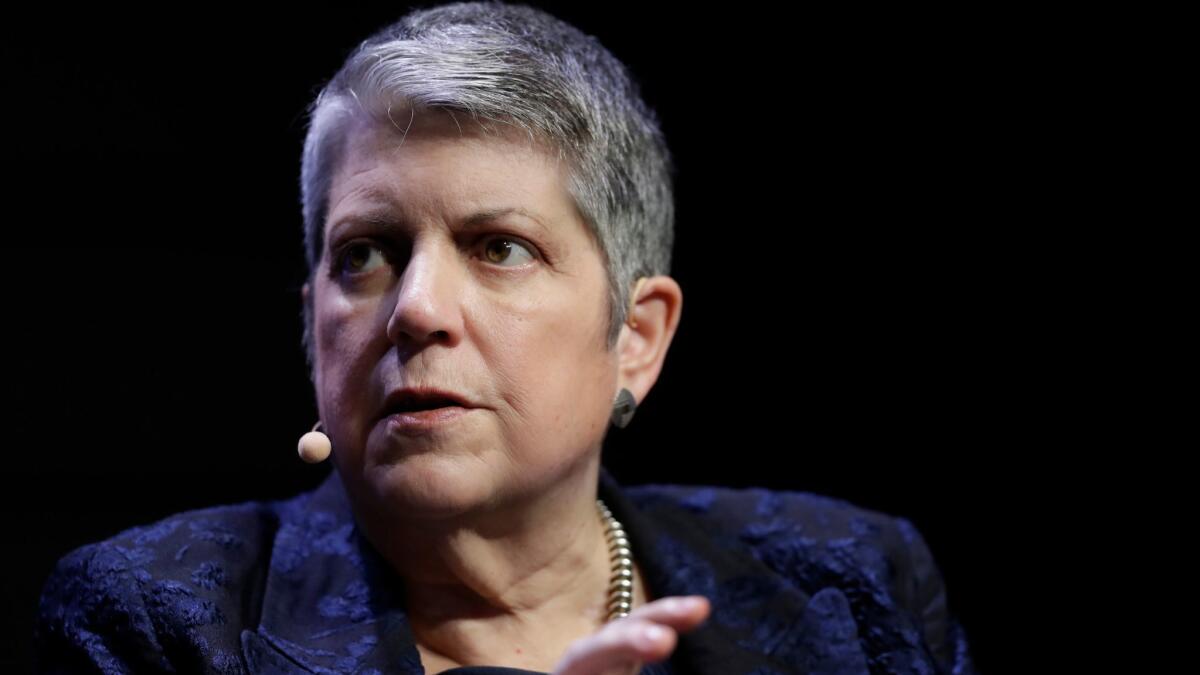Q&A: Janet Napolitano, former Homeland Security chief, explains why she said no to family separation

University of California President Janet Napolitano served as U.S. Homeland Security secretary for President Obama from 2009 to 2013. During that time, she says, she considered separating parents from their children as they were processed on charges of illegally entering the United States. But she says she quickly rejected that option, which the Trump administration now embraces. Napolitano spoke with The Times on Tuesday.
What do you think of the Trump policy of family separation?
I think it is bad policy. It is not a function of law and it is inconsistent with our values. And I think it has the effect of putting a human face on immigration. These are not all MS-13 gang member wannabes. These are parents with sometimes very young children trying to flee to a place where they can have greater opportunities for themselves and their families. This can be undone by the president with a phone call to the attorney general or the secretary of Homeland Security saying, ‘Let’s stop this.’”
Did the option of separating families come up while you were Homeland Security secretary?
Yes it did. We were dealing with how do we create a safe and secure border area. Would a change in how we handled these first-time migrants who were picked up … have any impact? As you work it through and you realize the difference between handling these as civil deportation matters as opposed to criminal prosecution matters, it was pretty clear off the bat that this would not be a good idea.
Why not?
Not only would it require the separation of families but it would be a misallocation of our uses of the U.S. attorney’s offices, which would have to pull assistant U.S. attorneys off of cases involving illegal arms, involving large drug shipments, involving human trafficking [and] into handling what under federal law is a misdemeanor, which is your initial apprehension for illegal entry into the United States. And that, in addition to consideration of what would happen to families or children, led us to conclude pretty quickly that it would be a bad idea. And it is.
We were very clear that on immigration enforcement, we would … prioritize the prosecution and deportation of those who committed serious crimes, those who were known gang members, those who were known security risks. One of the things that the current administration did shortly after they came in was to rewrite those priorities so that basically there are no priorities. Everybody’s treated the same. Everybody who’s caught gets criminally prosecuted, not just deported, which is where the separation of children and parents happens.
The Obama administration also detained families, though it did not separate them. Did that work as a deterrent?
No, and it was stopped after a pretty short period of time. Instead what they did was pursue immigration-court remedies so that parents would be given a return date to immigration court to handle their deportation along with their children. And they oftentimes had ankle bracelets or enhanced reporting in during the period between their initial appearance in immigration court and when they were called back for their actual deportation hearing. So the family detention idea didn’t last very long, as I recall.
What are effective short-term ways to discourage illegal immigration?
One technique that we tried that may have had some impact was to do public service announcements in Spanish in those countries, saying basically “Don’t come to the United States. If you get arrested, you will be deported.” And to basically communicate that the nation’s immigration laws were not a free pass.
What about long-term solutions?
What the United States should be doing is working with the countries that are the homes of many of these migrants to deal with the push circumstances … and to really focus on what is [causing] this kind of immigration, not on these policies that are unduly harsh and really put the United States in a bad light, not only to Americans of both parties but to the rest of the world. Focusing on the leadership of these countries where illegal immigration begins, on building up their own law enforcement and civil institutions … so they can crack down on gangs and gang violence … in the end will be the most effective way to control the migration from those countries because so many are coming to flee the dangerous circumstances.
More to Read
Sign up for Essential California
The most important California stories and recommendations in your inbox every morning.
You may occasionally receive promotional content from the Los Angeles Times.











